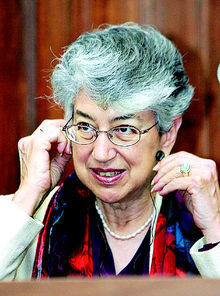hankyoreh
Links to other country sites 다른 나라 사이트 링크
U.S. health expert warns Korea about effects of FTA

What would happen if a government’s policy for public health comes under siege by lawsuits from foreign companies?
On June 4, Ellen Shaffer, co-director of the Center for Policy Analysis on Trade and Health (CPATH), participated in the International Symposium on New Trade Policy for America, KORUS FTA and Public Health, held at the National Assembly library in Seoul. In an interview with the Hankyoreh on June 3, Shaffer advised the National Assembly and civil society to take actions to prevent South Korea’s public health system from collapsing in the wake of the South Korea-U.S. FTA. CPATH, a U.S. non-profit private research center, played a leading role in raising the issue of public health and free trade in the wake of the launch of the World Trade Organization in 1995.
Recently, she said, voices are also growing in the U.S. to protect public health by reducing the advantages held by pharmaceutical and insurance companies. A South Korea-U.S. free trade agreement (FTA) is against this trend, she continued.
Already, the public medical insurance system in the U.S. has collapsed and about 45 million people - mostly in the low-income class, such as the unemployed - are suffering from lack of insurance coverage, Shaffer said. The free trade agreement will attack South Korea’s national health insurance system, she warned.
Shaffer said the North American Free Trade Agreement, in effect since 1994 between the U.S., Canada, and Mexico, has been undermining Canada’s state health insurance system. Whenever the Canadian government tries to offer insurance coverage for new medical treatments, she said, U.S. companies have filed a number of lawsuits against the Canadian government to block such moves. In addition, the Mexican government was ordered to pay US$17 million to a U.S. company after the government banned the American company from building a hazardous materials-processing facility, Shaffer continued.
However, Shaffer said the atmosphere is changing in the U.S. because of a widespread perception that America’s low-income class has been under serious threat due to recent free trade agreements. California state senators recently criticized the U.S. Trade Representative, saying the U.S.-Australia FTA was threatening its medical allowance system for the state’s low-income class, she said.
Compared with the U.S.-Australia FTA, Shaffer said, the pharmaceuticals-related text in the South Korea-U.S. FTA shows that drug companies will have more influence. Such texts are contrary to the U.S.’s new trade policy, so public opinion in South Korea should attack this point, she suggested.
If the texts come into force, Korean pharmaceutical prices will go up, the country’s public insurance system will collapse, and the government’s control on tobacco and alcohol will take a step back, she said.
Shaffer urged South Korea’s National Assembly and civic groups to take action.
In the U.S. trade advisory committee, there had been no spokesperson for public health, Shaffer said, while there were 42 spokespersons from food, pharmaceutical, and tobacco companies. But recently, the Bush administration, under pressure from public opinion, selected four spokespersons for public health to join the trade committee, she said.
It is time for the South Korean National Assembly and experts from civic groups to raise their voices, she offered.
The symposium was prepared by a policy committee of the Democratic Labor Party, Rep. Kim Tae-hong, chairman of the National Assembly’s committee for public heath and welfare, the Korean Federation of Medical Groups for Health Rights, and other organizations. The National Assembly’s committee for public health and welfare is now in discussions to hold a special parliamentary hearing regarding the South Korea-U.S. FTA.
Please direct questions or comments to [englishhani@hani.co.kr]
Editorial・opinion
![[Column] Season 2 of special prosecutor probe may be coming to Korea soon [Column] Season 2 of special prosecutor probe may be coming to Korea soon](https://flexible.img.hani.co.kr/flexible/normal/500/300/imgdb/original/2024/0426/3317141030699447.jpg) [Column] Season 2 of special prosecutor probe may be coming to Korea soon
[Column] Season 2 of special prosecutor probe may be coming to Korea soon![[Column] Park Geun-hye déjà vu in Yoon Suk-yeol [Column] Park Geun-hye déjà vu in Yoon Suk-yeol](https://flexible.img.hani.co.kr/flexible/normal/500/300/imgdb/original/2024/0424/651713945113788.jpg) [Column] Park Geun-hye déjà vu in Yoon Suk-yeol
[Column] Park Geun-hye déjà vu in Yoon Suk-yeol- [Editorial] New weight of N. Korea’s nuclear threats makes dialogue all the more urgent
- [Guest essay] The real reason Korea’s new right wants to dub Rhee a founding father
- [Column] ‘Choson’: Is it time we start referring to N. Korea in its own terms?
- [Editorial] Japan’s rewriting of history with Korea has gone too far
- [Column] The president’s questionable capacity for dialogue
- [Column] Are chaebol firms just pizza pies for families to divvy up as they please?
- [Column] Has Korea, too, crossed the Rubicon on China?
- [Correspondent’s column] In Japan’s alliance with US, echoes of its past alliances with UK
Most viewed articles
- 1[Column] Season 2 of special prosecutor probe may be coming to Korea soon
- 2No good, very bad game for Korea puts it out of Olympics for first time since 1988
- 3‘We must say no’: Seoul defense chief on Korean, USFK involvement in hypothetical Taiwan crisis
- 4Division commander ordered troops to enter raging flood waters before Marine died, survivor says
- 5Is Japan about to snatch control of Line messenger from Korea’s Naver?
- 6Korea’s 1.3% growth in Q1 signals ‘textbook’ return to growth, says government
- 7Is N. Korea threatening to test nukes in response to possible new US-led sanctions body?
- 8[Editorial] Korea’s surprise Q1 growth requires objective assessment, not blind fanfare
- 9[Editorial] New weight of N. Korea’s nuclear threats makes dialogue all the more urgent
- 10[Editorial] In the year since the Sewol, our national community has drowned